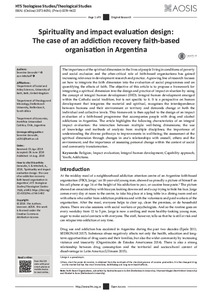Please use this identifier to cite or link to this item:
https://repositorio.uca.edu.ar/handle/123456789/8799| Título: | Spirituality and impact evaluation design : the case of an addiction recovery faith-based organisation in Argentina | Autor: | Mitchell, Ann Elizabeth Deneulin, Séverine |
Palabras clave: | RELIGION; POBREZA; JUVENTUD; DESARROLLO HUMANO; DESIGUALDAD SOCIAL; DESIGUALDAD ECONOMICA; ADICCIONES; EVALUACION DE IMPACTO | Fecha de publicación: | 2019 | Editorial: | AOSIS | Cita: | Deneulin, S. & Mitchell, A. (2019). ‘Spirituality and impact evaluation design: The case of an addiction recovery faith-based organisation in Argentina’". HTS Teologiese Studies/Theological Studies 75(4), a5482. doi:10.4102/hts.v75i4.5482. Disponible en: https://repositorio.uca.edu.ar/handle/123456789/8799 | Proyecto: | Desarrollo humano e inclusión social en asentamientos informales: una evaluación de impacto integral de los centros barriales del Hogar de Cristo en la Ciudad de Buenos Aires | Resumen: | Abstract: The importance of the spiritual dimension in the lives of people living in conditions of poverty and social exclusion and the often-critical role of faith-based organisations has gained increasing relevance in development research and practice. A growing line of research focuses on how to integrate the faith dimension into the evaluation of social programmes and on quantifying the effects of faith. The objective of this article is to propose a framework for integrating a spiritual dimension into the design and practice of impact evaluation by using the concept of integral human development (IHD). Integral human development emerged within the Catholic social tradition, but is not specific to it. It is a perspective on human development that integrates the material and spiritual, recognises the interdependence between humans and their environment or territory and demands change at both the individual and collective levels. This framework is then applied to the design of an impact evaluation of a faith-based programme that accompanies people with drug and alcohol addictions in Argentina. The article highlights the following characteristics of an integral impact evaluation: the interaction between multiple well-being dimensions; the use of knowledge and methods of analysis from multiple disciplines; the importance of understanding the diverse pathways to improvements in well-being; the assessment of the spiritual dimension through changes in one’s relationships with oneself, others and the environment; and the importance of assessing personal change within the context of social and community transformation. | URI: | https://repositorio.uca.edu.ar/handle/123456789/8799 | ISSN: | 0259-9422 (impreso) 2072-8050 (online) |
Disciplina: | ECONOMIA | DOI: | 10.4102/hts.v75i4.5482 | Derechos: | Acceso abierto | Fuente: | HTS Teologiese Studies/Theological Studies 75(4), 2019 |
| Appears in Collections: | Artículos |
Files in This Item:
| File | Description | Size | Format | |
|---|---|---|---|---|
| spirituality-impact-evaluation-argentina.pdf | 604,57 kB | Adobe PDF |  View/Open |
Page view(s)
560
checked on Feb 4, 2026
Download(s)
269
checked on Feb 4, 2026
Google ScholarTM
Check
Altmetric
Altmetric
This item is licensed under a Creative Commons License

